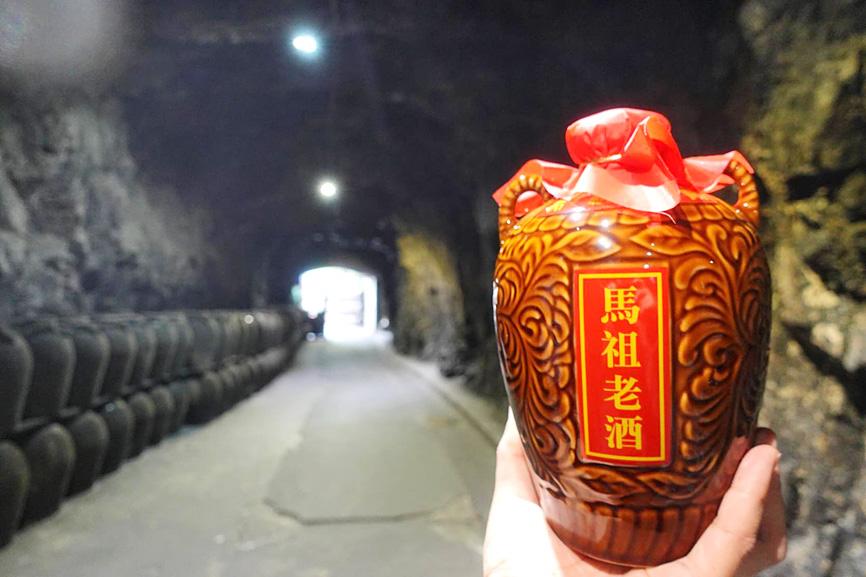A rice liquor distilled only in the Matsu Islands has been recognized as county-level intangible cultural heritage, Lienchiang County Cultural Affairs Department Director Wu Hsiao-yun (吳曉雲) said.
The liquor known as laojiu (老酒) is made with distilling techniques and equipment unique to the archipelago, and has a special place in Matsu’s gift-exchange culture, Wu told a news conference held by the county government on Aug. 5.
The county is to launch a program to promote the production and sale of the liquor and apply for the central government to recognize the beverage as national cultural heritage, she added.

Photo courtesy of a Matsu Island resident
Laojiu is an essential component of the archipelago’s culture, she said.
The beverage is consumed by fishers to warm themselves before going to sea, as well as utilized as an ingredient in medicinal foods prepared for women who have given birth, she said.
Local historian Yu Kuei-hsiang (游桂香) said that laojiu is the archipelago’s regional variant of huangjiu (黃酒), which is made from glutinous rice and red yeast rice during the winter months.
An incomplete survey found that 105 inhabitants of Nangan Island (南竿島), or 4.98 percent of the population, make laojiu at the 95 distilleries across the island, she said.
The report likely understates the number of inhabitants involved in making laojiu due to the secretiveness of the distillers, she said.
Matsu’s distillers have developed their own recipes with distinct flavor profiles using tradition that dates back a century, she said, adding that the history of the beverage reflects how the residents interact with their environment.
The local distilleries have persevered, despite a 1961 ban on alcohol production by the military, which directly governed Matsu as a frontier garrison at the time, she said.
Even today, distilleries jealously keep their laojiu production a secret out of fear that they could run afoul of the Tobacco and Alcohol Administration Act (菸酒管理法) or lose control of secret recipes, she said.

Palauan President Surangel Whipps Jr arrived in Taiwan last night to kick off his first visit to the country since beginning his second term earlier this year. After arriving at Taoyuan International Airport at around 6:30 pm, Whipps and his delegation were welcomed by Minister of Foreign Affairs Lin Chia-lung (林佳龍). Speaking to gathered media, the Palauan leader said he was excited and honored to be back in Taiwan on his first state visit to Taiwan since he was sworn in this January. Among those traveling with Whipps is Minister of State Gustav N. Aitaro, Public Infrastructure

President William Lai (賴清德) yesterday thanked Palau for its continued support of Taiwan's international participation, as Taipei was once again excluded from the World Health Assembly (WHA) currently taking place in Switzerland. "Palau has never stopped voicing support for Taiwan" in the UN General Assembly, the WHO and other UN-affiliated agencies, Lai said during a bilateral meeting with visiting Palau President Surangel Whipps Jr. "We have been profoundly touched by these endorsements," Lai said, praising the Pacific island nation's firm support as "courageous." Lai's remarks came as Taiwan was excluded for the ninth consecutive year from the WHA, which is being held in

RESOLUTIONS DEBATE: Taiwan’s allies said that UN and WHA resolutions cited by China and other nations ‘do not determine Taiwan’s participation in WHO activities’ A proposal to invite Taiwan to this year’s World Health Assembly (WHA) was rejected on Monday, resulting in Taipei’s absence from the annual meeting for a ninth consecutive year, although partners spoke up for Taiwan’s participation at the first day of the meeting. The first agenda item after the opening was a “two-on-two debate” on a proposal to invite Taiwan to participate at the WHA as an observer. Similar to previous years, two countries made statements in favor of the proposal, while two others expressed their opposition. Philippine Secretary of Health Teodoro Herbosa, president of the 78th WHA, accepted the WHA General Committee’s

At least three people died and more than a dozen were injured yesterday afternoon when a vehicle struck a group of pedestrians in New Taipei City’s Sansia District (三峽). The incident happened at about 4pm when a car rammed into pedestrians at an intersection near Bei Da Elementary School. Witnesses said the sedan, being driven at a high speed, ran a red light, knocking scooters out of the way and hitting students crossing the road before careening into a median near the intersection of Guocheng and Guoguang streets. The incident resulted in three deaths and 13 injuries, including the driver, a 78-year-old man